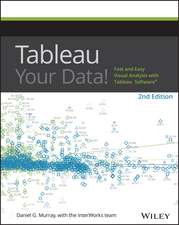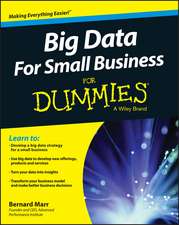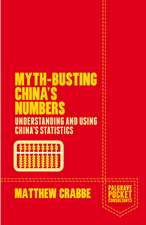A Very Short, Fairly Interesting and Reasonably Cheap Book About Knowledge Management: Very Short, Fairly Interesting & Cheap Books
Autor Joanne Robertsen Limba Engleză Paperback – 2 iul 2015
Conceived by Chris Grey as an antidote to conventional textbooks, each book in the ‘Very Short, Fairly Interesting and Reasonably Cheap’ series takes a core area of the curriculum and turns it on its head by providing a critical and sophisticated overview of the key issues and debates in an informal, conversational and often humorous way.
Suitable for students of Business and Management courses at Undergraduate and Postgraduate level and anyone interested in the concept of knowledge management.
Preț: 199.33 lei
Nou
Puncte Express: 299
Preț estimativ în valută:
38.15€ • 39.68$ • 31.49£
38.15€ • 39.68$ • 31.49£
Carte tipărită la comandă
Livrare economică 14-28 aprilie
Preluare comenzi: 021 569.72.76
Specificații
ISBN-13: 9780857022479
ISBN-10: 0857022474
Pagini: 168
Dimensiuni: 129 x 198 x 10 mm
Greutate: 0.16 kg
Ediția:1st
Editura: SAGE Publications
Colecția Sage Publications Ltd
Seria Very Short, Fairly Interesting & Cheap Books
Locul publicării:London, United Kingdom
ISBN-10: 0857022474
Pagini: 168
Dimensiuni: 129 x 198 x 10 mm
Greutate: 0.16 kg
Ediția:1st
Editura: SAGE Publications
Colecția Sage Publications Ltd
Seria Very Short, Fairly Interesting & Cheap Books
Locul publicării:London, United Kingdom
Recenzii
A masterly short book that offers in-depth and critical explanations on the key principles of Knowledge Management, written by an author with deep knowledge of her subject. The chapter on ignorance is worth the price alone and should be read by all practicing decision makers.
A Very Short, Fairly Interesting and Reasonably Cheap Book about Knowledge Management is a lucid, thoughtful and engaging book that competently covers a range of topical issues associated with knowledge management and its complexity. Joanne Roberts does an excellent job in offering an accessible must-read for university students who seek to develop their understanding of the field. The book is of real value also to academics who enjoy an original and truly interesting read.
This short book is a real tour de force. In a few pages, Professor Roberts not only exposes and analyses the essential of knowledge management, but she invites us to discover the other side of knowledge, ignorance and the unknown, and their impact on management. The reader is being offered a unique and outstanding guidance through the different aspects of knowledge management. In particular, the book convincingly explains how knowledge management differs from, and is related to the concepts of information management, organizational learning, innovation management and creativity management.
I have recently read "A Very Short, Fairly Interesting Book About KM" and I greatly admired it. I have always believed that the vast multi-faceted KM domain needs efforts that provide a succinct overview of the field to guide practitioners and new researchers and [this] book does exactly that.
I really enjoyed reading this little book on knowledge management. I wish I had read it at the start on my PhD before diving into the 'deep end' of the knowledge literature. Having come from a clinical science background it was great to have it explained simply! I’ve already recommended it to a colleague.
Roberts does well throughout to present a thorough yet fast-paced account of the field of knowledge management and her book is one that is well-placed as a potential resource to scholars coming to knowledge management for the first time as much as it is to undergraduate and postgraduate students.
As a second year doctoral student in the KM field, I was blown away by the depth and resonance of your work, I really think the title is misplaced, as you have managed (somehow) to pack in all the relevance of the KM field into one volume. It should be titled "everything there is to know about KM!"
Primarily written for college students, these works are not intended to be used as textbooks but rather as short, introductory monographs. Roberts (Univ. of Southampton, UK) has an extensive publication record in knowledge and learning in organizations. Her purpose in writing this book is "to take a critical view of knowledge management” and to challenge the standard perspectives on the nature and future of knowledge management. This approach provides an alternative to the ones used by typical management textbooks... [The book is] is recommended for its clarity and brevity in discussing a complex and contemporary area of study.
While the book engages seriously with the intellectual ideas and concepts discussed, it is written in an accessible style, which I think students would find appealing, and which makes the book accessible to anyone not familiar with the topic of knowledge management.
A Very Short, Fairly Interesting and Reasonably Cheap Book about Knowledge Management is a lucid, thoughtful and engaging book that competently covers a range of topical issues associated with knowledge management and its complexity. Joanne Roberts does an excellent job in offering an accessible must-read for university students who seek to develop their understanding of the field. The book is of real value also to academics who enjoy an original and truly interesting read.
This short book is a real tour de force. In a few pages, Professor Roberts not only exposes and analyses the essential of knowledge management, but she invites us to discover the other side of knowledge, ignorance and the unknown, and their impact on management. The reader is being offered a unique and outstanding guidance through the different aspects of knowledge management. In particular, the book convincingly explains how knowledge management differs from, and is related to the concepts of information management, organizational learning, innovation management and creativity management.
I have recently read "A Very Short, Fairly Interesting Book About KM" and I greatly admired it. I have always believed that the vast multi-faceted KM domain needs efforts that provide a succinct overview of the field to guide practitioners and new researchers and [this] book does exactly that.
I really enjoyed reading this little book on knowledge management. I wish I had read it at the start on my PhD before diving into the 'deep end' of the knowledge literature. Having come from a clinical science background it was great to have it explained simply! I’ve already recommended it to a colleague.
Roberts does well throughout to present a thorough yet fast-paced account of the field of knowledge management and her book is one that is well-placed as a potential resource to scholars coming to knowledge management for the first time as much as it is to undergraduate and postgraduate students.
As a second year doctoral student in the KM field, I was blown away by the depth and resonance of your work, I really think the title is misplaced, as you have managed (somehow) to pack in all the relevance of the KM field into one volume. It should be titled "everything there is to know about KM!"
Primarily written for college students, these works are not intended to be used as textbooks but rather as short, introductory monographs. Roberts (Univ. of Southampton, UK) has an extensive publication record in knowledge and learning in organizations. Her purpose in writing this book is "to take a critical view of knowledge management” and to challenge the standard perspectives on the nature and future of knowledge management. This approach provides an alternative to the ones used by typical management textbooks... [The book is] is recommended for its clarity and brevity in discussing a complex and contemporary area of study.
While the book engages seriously with the intellectual ideas and concepts discussed, it is written in an accessible style, which I think students would find appealing, and which makes the book accessible to anyone not familiar with the topic of knowledge management.
Cuprins
Introduction: The Rise of Knowledge Management
Chapter 1: Situating Knowledge Management
Chapter 2: Knowledge Management?
Chapter 3: Knowledge Acquisition, Retention and Transfer
Chapter 4: Knowledge, Creativity and Innovation
Chapter 5: Ignorance, Forgetting and Unlearning
Conclusion: Looking Forward
Chapter 1: Situating Knowledge Management
Chapter 2: Knowledge Management?
Chapter 3: Knowledge Acquisition, Retention and Transfer
Chapter 4: Knowledge, Creativity and Innovation
Chapter 5: Ignorance, Forgetting and Unlearning
Conclusion: Looking Forward
Notă biografică
Descriere
This affordable and accessible introduction to knowledge management offers a critical look at the history, nature and future of the field, providing essential reading for those questioning contemporary management practices.


























